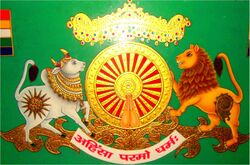Religion:Animal rights in Jainism, Hinduism, and Buddhism
The respect for animal rights in Jainism, Hinduism, and Buddhism derives from the doctrine of ahimsa.[1][2]
In Hinduism, animals contain a soul just like humans; when sentient beings die, they can either be reincarnated as a human or as an animal.[3]
These beliefs have resulted in many Hindus practicing vegetarianism, while Jain doctrine mandates vegetarianism based on its strict interpretation of the doctrine of ahimsa.[3] Mahayana Buddhists similarly practice vegetarianism and Mahayana Buddhism prohibits the killing of animals.[4]
Jainism
Almost every Jain community in India has established animal hospitals to care for injured and abandoned animals.[4] Many Jains also rescue animals from slaughterhouses.[4]
Hinduism
Hinduism teaches that a part of God resides in all living things, which forms the atman.[5] As such, reverence and respect for animals is taught.[5]
In Hinduism, many animals are venerated, including the tiger, the elephant, the mouse, and especially, the cow.[4]
Mahatma Gandhi is noted for his compassion to all living things; he advocated against animal experimentation and animal cruelty.[4]
Mahayana Buddhism
Mahayana Buddhism teaches that "we can only escape our own suffering if we avoid inflicting it on others."[4] Mahayana Buddhists practice vegetarianism to this end.[4]
See also
- Animals in Islam
- Christian vegetarianism
References
- ↑ Grant, Catharine (2006) (in English). The No-nonsense Guide to Animal Rights. New Internationalist. p. 24. ISBN 9781904456407. https://archive.org/details/nononsenseguidet0000gran. "These religions emphasize ahimsa, which is the principle of non-violence towards all living things. The first precept is a prohibition against the killing of any creature. The Jain, Hindu and Buddhist injunctions against killing serve to teach that all creatures are spiritually equal."
- ↑ "Animal rights" (in English). BBC. https://www.bbc.com/bitesize/guides/z3ygjxs/revision/5. Retrieved 17 March 2019. "The main reason for Hindu respect for animal rights is the principle of ahimsa. According to the principle of ahimsa, no living thing should be harmed. This applies to humans and animals. The Jains’ belief system takes the principle of ahimsa regarding animals so seriously that as well as being strict vegetarians, some followers wear masks to prevent them breathing in insects. They may also sweep paths with a small broom to make sure they do not tread on any living creatures."
- ↑ 3.0 3.1 Owen, Marna A. (2009) (in English). Animal Rights: Noble Cause Or Needless Effort?. Twenty-First Century Books. p. 12. ISBN 9780761340829. https://archive.org/details/animalrightsnobl0000owen/page/12.
- ↑ 4.0 4.1 4.2 4.3 4.4 4.5 4.6 Grant, Catharine (2006) (in English). The No-nonsense Guide to Animal Rights. New Internationalist. p. 22–26. ISBN 9781904456407. https://archive.org/details/nononsenseguidet0000gran.
- ↑ 5.0 5.1 Gibson, Lynne (2002) (in English). Hinduism. Heinemann. ISBN 9780435336196.



